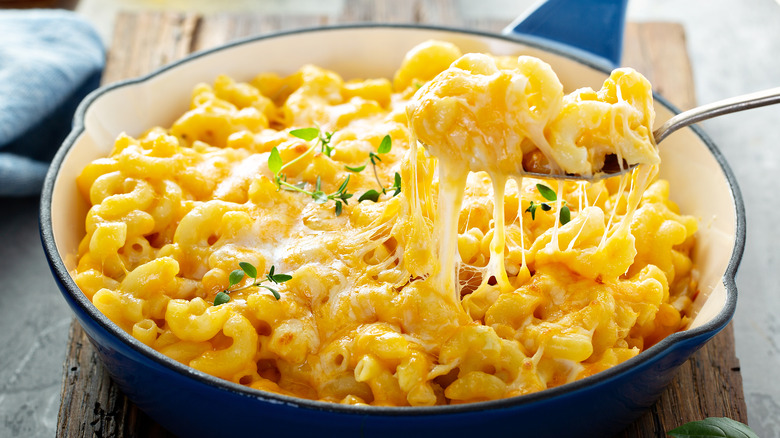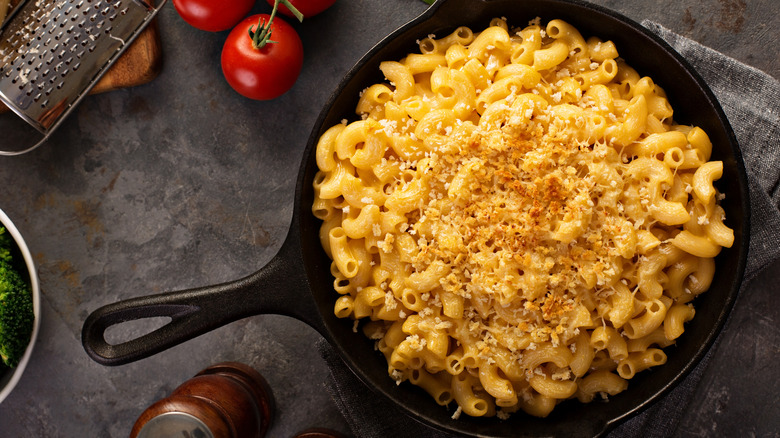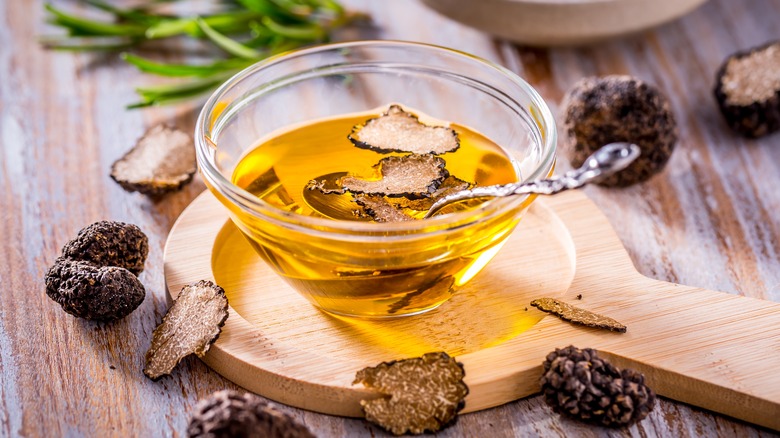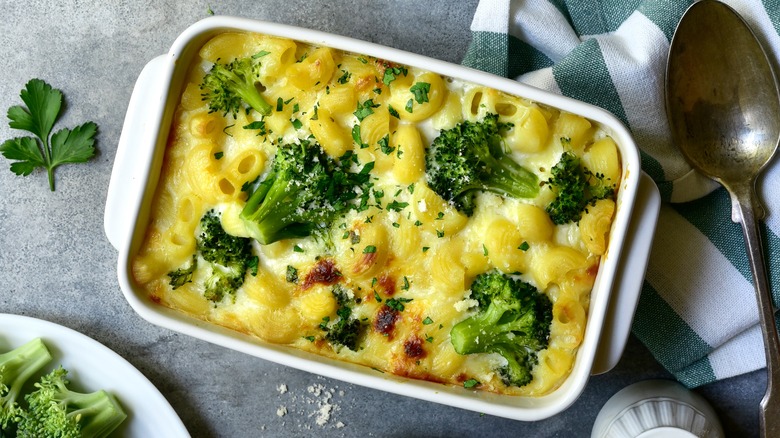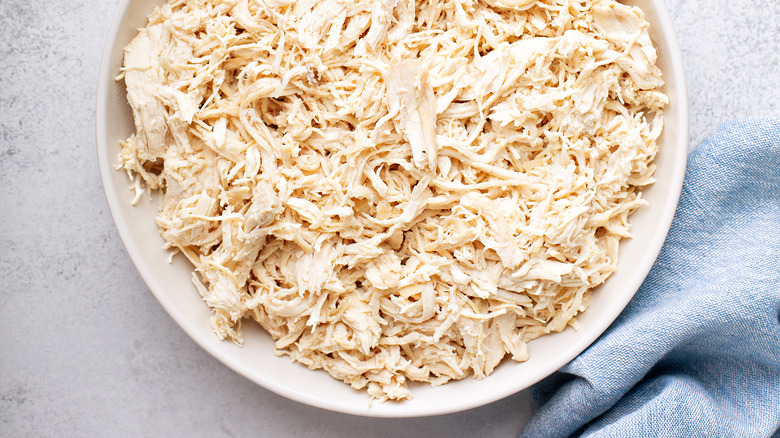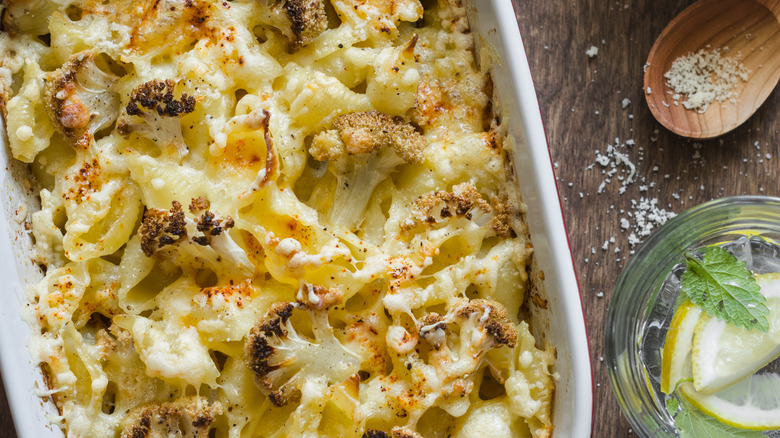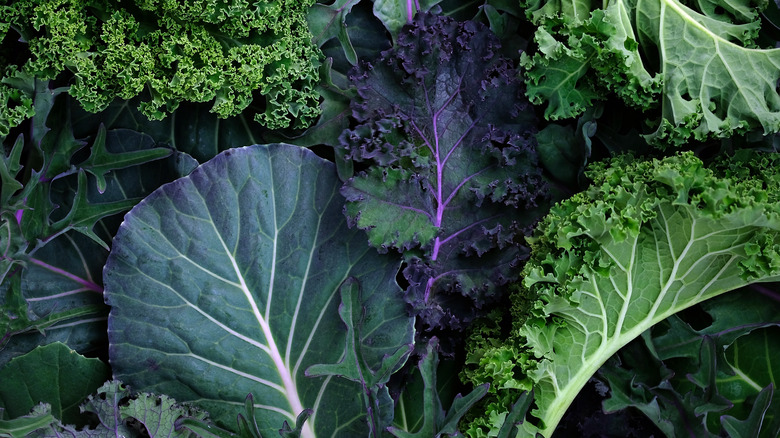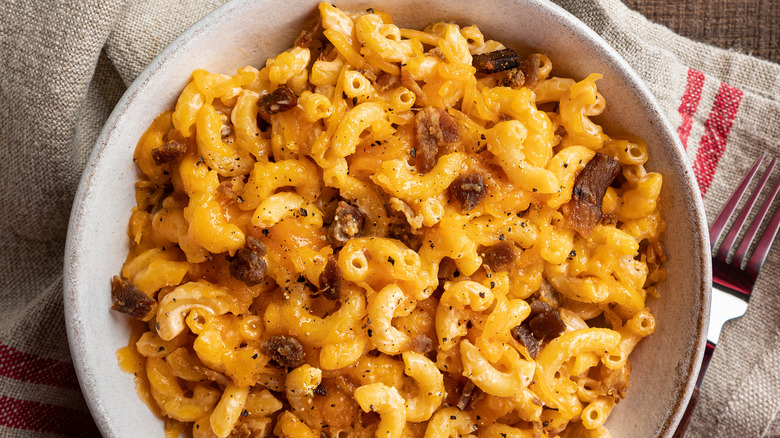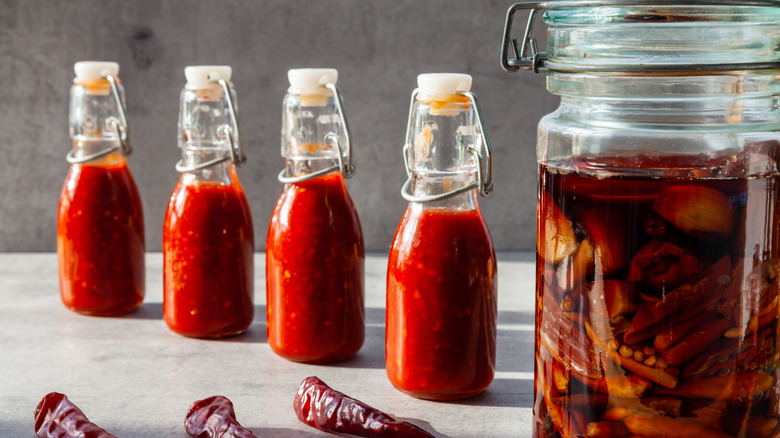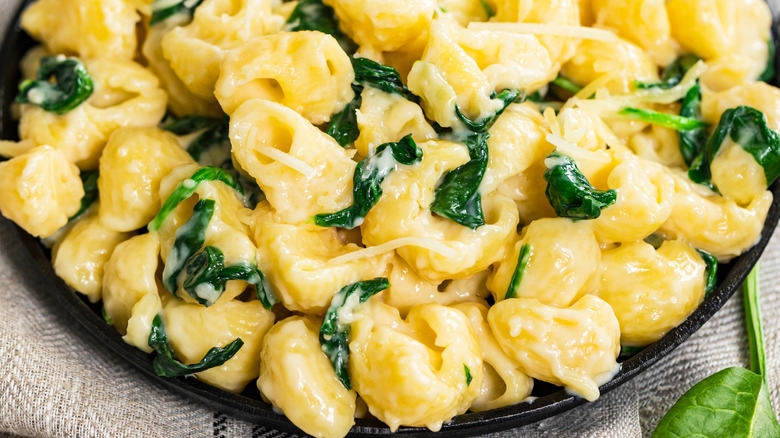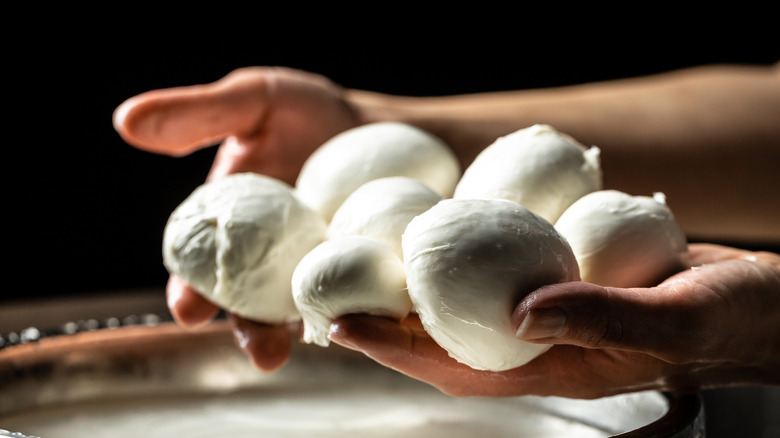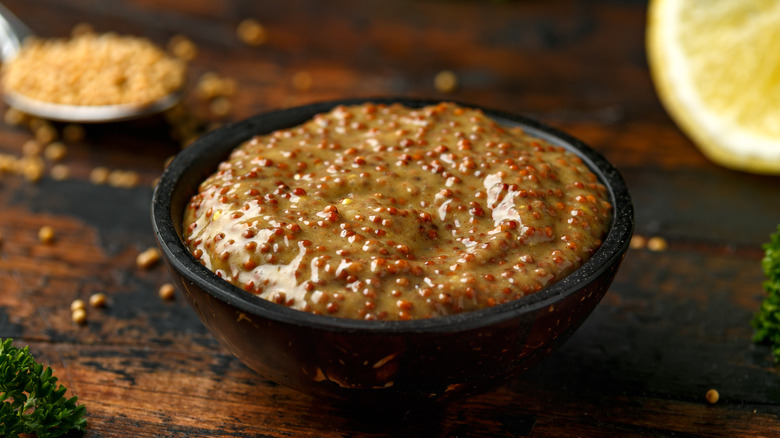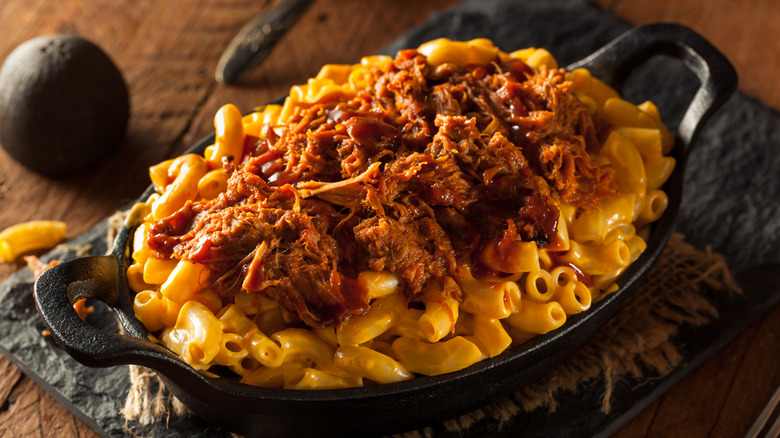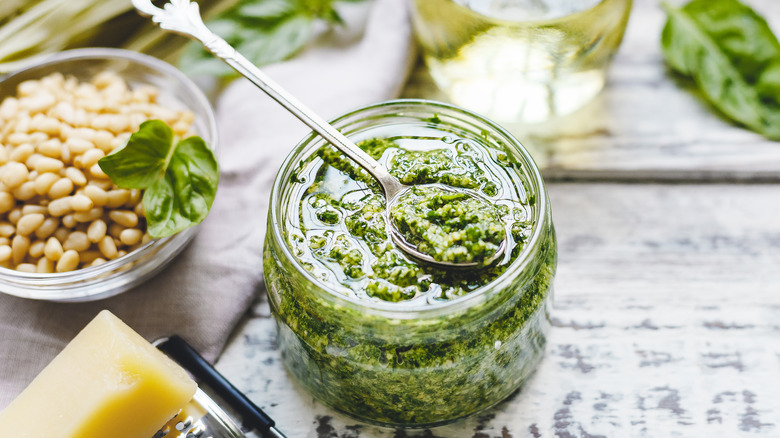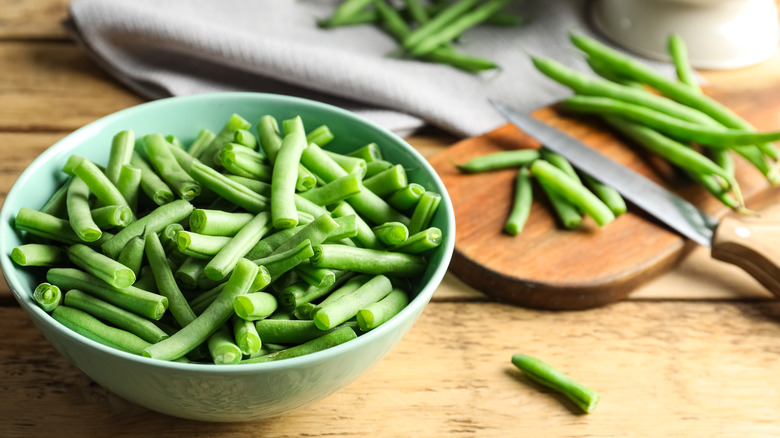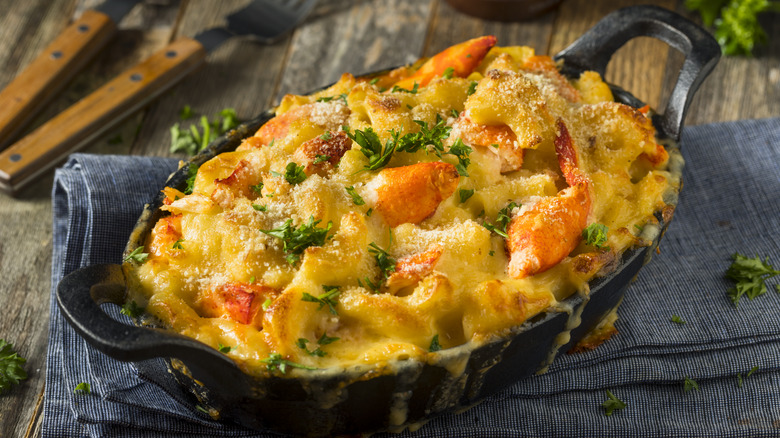The 15 Best Additions To Mac And Cheese
Mac and cheese is a staple of the American diet, and there's no doubt about why — with rich, creamy, cheesy sauce coating each curl of pasta, it's the epitome of comforting indulgence. Unsurprisingly, the dish was first made in 13th-century Italy, says History.net. It was popularized in America after the third U.S. President, Thomas Jefferson, became smitten with the dish after tasting it during his Mediterranean travels. Thomas Hemings, at the time one of Jefferson's slaves, went with Jefferson to France and apprenticed with a pastry chef, a caterer, and as a chef to a prince. There, Hemings learned the recipe for mac and cheese and brought it back to America with him. The rest, as they say, is history.
Since then, mac and cheese dishes have evolved dramatically. In 1937, Kraft sold over nine million boxes in just one year, making it an instant success, (via Insider). For most Americans, gone are the days of making mac and cheese with the perfect roux; the convenience of instant mac and cheese reigns supreme. Whichever camp you favor, we've all come home and craved nothing but a big, hot, steaming bowl of mac and cheese at some point. Believe it or not, mac and cheese can be made extravagant, luxurious, or even healthy — it's all down to what you add to it. From different meats to vegetables and seafood, let's jump in.
Breadcrumbs
Crispy and golden breadcrumbs are the most traditional addition to mac and cheese. The interplay of texture between soft pasta and rich, buttery breadcrumbs is the reason why this combination has endured the test of time. Grilling your mac and cheese with breadcrumbs on top works whether you use boxed mac and cheese or homemade, but for either option, we recommend stirring through some extra milk to prevent the dish from drying out once under the grill.
If you're short on time, opt for Japanese panko breadcrumbs: The difference between panko and other breadcrumbs is that they are lighter, crisper, and more delicate than their counterparts. Considered the golden standard for breadcrumbs by many chefs, simply mix with some melted butter, and then sprinkle over the mac and cheese before cooking. Celebrity chef Ina Garten, however, suggests you should never buy breadcrumbs. If you're an advocate for homemade like Garten, simply pick a good crusty bread, stick it in the food processor, and blitz. You can mix it with seasonings of your choice like smoked paprika or parmesan, before layering them over your mac and cheese.
Truffle
You've likely seen truffle mac and cheese on the menus of many high-end restaurants. It's one of the most prevalent methods to elevate the humble mac and cheese to luxury status full of decadence. According to Smithsonian Magazine, truffles are a type of mycorrhizal fungi, meaning that they grow underground, having developed a symbiotic relationship with the roots of plants around them. Truffles are extremely rare and time-consuming to cultivate as they are picked by hand. And on top of that, we need animals to sniff out the truffles for us, all of it which contributes to a hefty price tag — Italian white truffles have been known to sell for over $100,000.
Don't let this put you off of truffle mac and cheese, though. Although fresh truffles may be unaffordable to most of us, there are still ways to capture that characteristically deep, earthy, and intensely heady flavor. Try a combination of truffle oil, Oprah's favorite truffle salt, or truffle cheese for a surprisingly intense flavor. Add truffle oil to your mac and cheese before cooking, and add an extra drizzle for good measure. Truffle salt and cheese, on the other hand, can be cooked straight into your recipe.
Broccoli
Fresh broccoli with crisp stalks and delicate florets is perfect for creamy mac and cheese. It adds color, flavor, and texture to a dish that dare we say, can sometimes be monotonous. Plus, broccoli isn't just healthy – PR Newswire reported that a 2022 survey by Green Giant revealed broccoli to be America's favorite vegetable, so this mac and cheese addition is sure to be a hit.
Broccoli works particularly well in baked mac and cheese: Simply cut your broccoli into small florets and mix it through your mac and cheese, ensuring that there's enough pasta covering the broccoli before putting it to bake. This is a great dinner option when you're short on time and don't want to make much effort. Adding a little extra protein isn't a bad plan, either; chicken and broccoli are a great healthy combination that works exceptionally well with mac and cheese. If you prefer a quick mac and cheese cooked on the stovetop, we recommend stirring through some easy steamed broccoli.
Shredded chicken
If creamy, chicken, and pasta sound like a match made in heaven for you, then you're going to love mac and cheese mixed with shreds of tender, juicy chicken. Not only is this a great way to add extra protein to your meal, but it's also ideal for using up leftovers: Any remaining chicken breasts or thighs (boneless is preferable for easy preparation) can be transformed into a delicious and filling meal for the whole family.
While robust chunks of chicken are a great option, shredded chicken works splendidly if you like succulent meat in every mouthful. You may be under the impression that shredding chicken is hard work, but the easiest way to shred chicken uses a common kitchen appliance: an electric hand mixer. This method works best for boneless chicken. If you're using bone-in meat, we recommend using your hands to shred the chicken. This way, you'll be able to easily identify and pick out any bones.
Roasted cauliflower
Trust us when we say there is nothing quite like a silky, creamy mac and cheese with slightly charred, sweet, and crunchy roasted cauliflower peeping out from under all the cheese. As a step up from the traditional English cauliflower cheese you might find on your Sunday dinner, this dish promises to be melt-in-the-mouth, velvety, hearty, comforting, and subtly sweet.
The addition of cauliflower here undoubtedly means that this mac and cheese is best baked until browned and bubbling. Blanch the cauliflower before baking for a divinely crunchy and firm bite that still retains the classic creaminess of cauliflower. To mix things up and add some visual interest, why not use one of the many different color varieties of cauliflower? Or, if you want to play with flavors, you can pre-roast your vegetable with an array of spices before mixing it into mac and cheese. Who said vegetables have to be boring? Certainly not us.
Kale
We know, we know. When we say kale, your mind might automatically conjure up images of massaged kale salads, Buddha bowls, or kale smoothies. This leafy green vegetable has a reputation for being the best super green – and the hype isn't wrong. It's a powerhouse that can help your immune system, protect your eyesight, improve your skin, help you maintain blood sugar levels, and lower your risk of diseases. Having said that, there's no reason why you need to be restricted to recipes like salads or smoothies. Not only is kale one of the best-tasting additions to mac and cheese, but it's also a great way to eat nutrient-dense vegetables without sacrificing flavor and the feeling of true comfort food. Let's be honest, nobody's comfort food is kale smoothies. We're choosing kale mac and cheese any day of the year.
We recommend curly kale, as it's aesthetically pleasing and commonly accessible in supermarkets. Tuscan kale is also a fantastic choice. You'll be glad to hear that neither variety needs to be massaged; all you need to do is blanch, then mix into your cheese-sauce-covered macaroni.
Bacon bits
We're going to throw you a curve ball: Mac and cheese with bacon bits can be vegetarian. Who would have thought it? As it turns out, most bacon bits are vegan. The ingredients commonly include textured soy with diverse flavorings that imitates the smoky crisp of the real deal. While real bacon bits are available to purchase (Hormel is one of the most beloved options), if you're not averse to a little extra cooking and want to add rich, meaty, and salty flavor to your mac and cheese, you can make your own with cold thick-cut bacon. Cook it in an oven for 20 minutes until crispy, then cool and crumble it into fine pieces.
Whether you use imitation or real bacon bits, this remains an impressive way to elevate a homely mac and cheese to a crowd-pleasing dinner that everyone will complement. Just sprinkle these little flavor nuggets over your mac and cheese so they retain their full crunch, or stir them through the dish to experience the full effect of their intense flavor.
Hot sauce
Do you ever get the craving for something spicy? We do — and we're big fans of pairing cheese with hot peppers. You may be thinking that adding hot sauce to mac and cheese sounds a little strange, but think again. Chili peppers and cheese are a classic combination: Just picture hot and spicy nachos smothered with cheese or spreadable cheese with chili flakes. Delicious, right?
Although it seems as if hot sauce may be too intense for a mild dish like mac and cheese, the science says otherwise. Per Culture Cheese Mag, the active compound in chili peppers which makes them spicy, capsaicin, has an antithesis, casein. Casein happens to be one of the basic components of every cheese and actively works to numb the heat of capsaicin. This means that heat isn't going to overpower your mac and cheese. Instead, it'll create new flavors. While there are so many hot sauce brands at the grocery store, we recommend pairing whichever you choose with a strong cheese that can hold its own against the heat, like gouda or aged cheddar.
Spinach
You'll have no problem eating your greens with creamy, luscious mac and cheese combined with tender green spinach. Children and adults alike will eagerly scoff down tons of healthy and tender spinach once it's been cooked down. We recommend using more spinach than you anticipate since spinach shrivels when you cook it. What looks like a ginormous bowl of raw spinach that you could never finish will soon shrink to a manageable amount packed full of nutrients. Spinach, like other vegetables, loses a lot of nutrients after cooking — but since you'll eat far more cooked spinach, it remains an important source of antioxidants and vitamins.
We recommend gently sautéing your spinach with optional onions before layering it into baked mac and cheese. Alternatively, raw spinach can be added directly to the pot of mac and cheese. It only takes a minute for spinach to wilt under heat and can be served immediately. If you don't have fresh spinach on hand, don't fear — cooking with frozen spinach is a wonderful option, too. Frozen spinach is economical and contains all the same nutritional value as fresh, per LiveStrong. Defrost it in your microwave or blanch, then add it to your mac and cheese.
Extra cheese
You knew it was coming. After all, very few meals aren't improved by an extra portion of cheese. If you've been making your homemade mac and cheese with just a basic cheddar, you've been missing out. If you've been making mac and cheese with only Velveeta, you've doubly been missing out... even if it is nostalgic.
While the best cheeses to use for mac and cheese vary from Gruyère to Monterey Jack, we recommend using a mixture of different cheeses to capitalize on the different textures and flavor strengths of each. Sharp cheddar cheese is always a crowd-pleaser and a great base for mac and cheese — from there you can opt for a combination of mozzarella and cream cheese to make a creamy, melty and mild sauce. Alternatively, combine cheddar with Gruyère and Parmesan to achieve a saltier, nuttier finish. No matter which cheese you use, make sure to grate your own; according to KCET, pre-grated cheese doesn't melt so well into dishes because it includes anti-caking agents like potato starch, powdered cellulose, and natamycin. The verdict is clear: For the best gooey, melty, and creamy mac and cheese, you must grate your own.
Mustard
For us, mustard is less an addition and more of a must-have. Recipe developer Jessica Monroe says that the Dijon mustard she uses in her baked mac and cheese recipe adds a nice tanginess and rounds out the flavor profile. Since using this tip, we haven't looked back. English celebrity chef Nigella Lawson agrees, stating that the flavor and acidity of mustard help cut through the cheese's richness. Contrary to Jessica, she recommends using English mustard with a sharp, pungent flavor.
While Dijon mustard and English mustard are classic choices, there are so many different types of mustard, with each bringing a unique quality to the table. We recommend spicy brown mustard if you'd like to add spice to your dish. On the other hand, honey mustard is a mild variety that brings sweet notes to the forefront: This will work excellently in tandem with other additions like shredded chicken or broccoli. Add a tablespoon of your chosen mustard to your béchamel or cheese sauce, and you're good to go.
Pulled pork
Ever wondered what to bring to a cookout, or what to make for dinner? Here's a dish that fits all occasions. Pulled pork is classic Southern comfort food (or celebratory food, depending on who you ask) that is typically served with a side of mac and cheese. The slow-cooked juicy meat is extremely flavorsome once it's been cooked with barbecue sauce, mustard, cider vinegar, sugar, and spices. Combining these two classics into one dish by adding pulled pork on top of your mac and cheese allows the pasta to soak up all the juices and sauce from the meat. Delicious, right?
Even vegetarians can join in on the fun — use canned jackfruit to make vegan pulled pork which is scrumptious enough to fool any pulled pork aficionado. Once you've plated the pulled pork above your mac and cheese, drizzle some extra barbecue sauce on top. Any leftover cheese or juices can be mopped up with soft bread once you've finished.
Pesto
Pesto alla Genovese is a traditional Italian sauce that is typically served stirred through pasta, drizzled on fresh pizza, or spread over sandwich bread. A classic basil pesto recipe is made by pounding together fresh basil with copious amounts of garlic, salt, roasted pine nuts, earthy olive oil, and Parmesan cheese. The ingredients shine when eaten raw, and to preserve the freshness of taste, shouldn't be cooked, (via Go Pesto). The brand continues by noting that pre-made jarred sauce can hold up to higher heat. To sum up: If you use fresh pesto, stir it through your mac and cheese just before serving, so the residual heat warms it; or, use jarred pesto and cook it concurrently with the mac and cheese.
If you've ever found yourself thinking that your mac and cheese is too heavy, this may be a great option for you. The bright intensity of pesto cuts through the rich dairy-based mac and cheese and contributes a fresh piquancy that makes it the star of the show.
Green beans
Hear us out: green bean casserole and mac and cheese. Combined? Divine. We're honestly shocked that mac and cheese baked with green beans aren't more popular, considering both dishes' legendary status in American cuisine. We'll do away with the mushroom soup traditionally added to green bean casserole and scale it back to basics; green beans, black pepper, and fried onions. Fresh, canned, or even frozen green beans are suitable. NPR reports that a recent study found that frozen vegetables are just as healthy, as they lock in nutrients, and some were even found to have higher levels of vitamin E.
Gently cook your green beans in butter, and season with salt and pepper. Combine them with mac and cheese (a cheese sauce made with Colby Jack works well in tandem with the green beans), pop it under the grill, and top with fried onions, à la green bean casserole.
Lobster
Decadence is not usually a word you'd associate with mac and cheese, but in this case, it's the best description. We recommend that you take the time to make homemade mac and cheese (roux and all) for this one. A truly elegant and sophisticated affair, the buttery lobster deserves the best mac and cheese you've got.
Before you cook the lobster, you need to select the right one. If you're buying fresh, look for a healthy and lively specimen from a clean establishment, says Lobster Anywhere. The company further advises that you should opt for a cold-water lobster variety like Maine or Canadian, as they're larger and healthier than their counterparts. When it comes to different shells though, it's all down to your texture and flavor preferences. While hard-shell lobsters are firmer and meatier, the soft-shell variety is sweeter and more tender. Once you've selected your lobster, use the tails and broil in butter or boil. Stir through your mac and cheese and plate up with fresh parsley.
